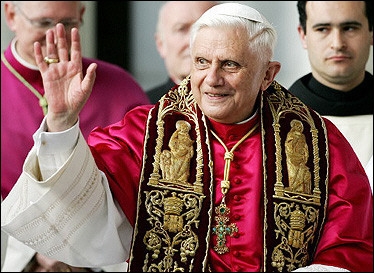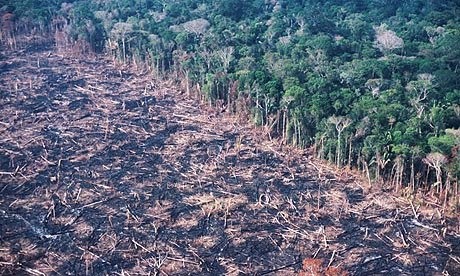With the continued clearing of the Amazon rainforest nearly the size of Connecticut every year, it is apparent that the methods of action proposed or previously executed by the country of Brazil, as well as the entire global community, prove relatively ineffectual. To eliminate the tragedy that is deforestation, it seems that Brazil must turn to other sources for assistance. As a predominantly Roman Catholic country, the citizens of Brazil should strive to end deforestation based principally on their Christian values that emphasize love and respect towards all of God’s creations, as revealed through Genesis 1:28 in which God placed the care of “every living thing that moves on the earth” in the hands of all mankind. Reflecting on these values, Pope Benedict XVI stated this year that “mankind must renew and strengthen ‘that covenant between human beings and the environment, which should mirror the creative love of God.’” (Hance)
 Though even if Catholics truly believe in the teachings of the Bible, it is an unfortunate aspect of human nature to remain inactive when faced with a problem, not because of apathy, but rather not knowing how to take the first step to resolve the issue. The question then becomes: What are actual ways that Brazilians, as well as others in the global community, can put their Christian values into action to end deforestation?
Though even if Catholics truly believe in the teachings of the Bible, it is an unfortunate aspect of human nature to remain inactive when faced with a problem, not because of apathy, but rather not knowing how to take the first step to resolve the issue. The question then becomes: What are actual ways that Brazilians, as well as others in the global community, can put their Christian values into action to end deforestation? Recently in Thailand, Catholics and Buddhists came together to combat the evils of deforestation through a “forest consecration” in which orange cloths, symbolizing the robes of Buddhist monks, were tied around trees to represent their sanctification. (Thailand) While this did not particularly occur in the Amazon, the act nevertheless demonstrates the effective impact that religion, especially when combined with others in the global community, has on environmental problems like deforestation.

As an issue that shows complete disregard for all of God’s creation, deforestation needs to be stopped, as Pope Benedict XVI states, “for the benefit of people now and in the future”. (Hance)
Works Cited
Hance, Jeremy. "Pope Benedict: Environmental Crisis Requires Review of World's Economic Model." Conservation and Environmental Science News. 15 Dec. 2009. Web. 8 May 2010.
"Thailand: Buddhists, Catholics Join Forces to Fight Deforestation on." Independent Catholic News. 1 July 2009. Web. 8 May 2010.

On a global standpoint, progression has slowed to a breaking point simply because the population, as Megan stated, has remained passive for too long. Upon attempting to address the issue, too many blanks were drawn as to what the first step is and what the top priority is. Therefore, rather than think of methods to bring an end to deforestation, the first principle target should be to understand the background of how this transgression was made.
ReplyDeleteThe majority of people today have lost their ways and have become blind sighted due to greed and gluttony. An insatiable will to want what’s new involves development and improvements. This immoral desire goes against both Eastern and Western religious principles of maintaining equilibrium within the world. It embraces evil within the yin and yang balance on this planet creating disaster. This turmoil of destruction goes against God’s message within Christianity and the basic principles within Buddhism. “Furthermore, the degradation that is created causes all to lose the wisdom and culture cultivated from the symbiotic living with our natural surroundings (Yamamoto).”
From this understanding, methods can be developed to stop this tragedy. For example, in Brazil, people can form charitable organizations directed towards the protection of the Amazon Rainforest or begin a protest in hopes that the government will “bow to he wishes of the newly convinced public” just as Catholic Bishop Guilherme Antonio Werlang did (Hill).
Hill, Joshua S. "Catholic Bishop Strikes Out at Brazilian Deforestation : EcoLocalizer." EcoLocalizer - Celebrating Local Environmental Action. 10 Feb. 2008. Web. 10 May 2010. .
I believe the government and people of Brazil should reexamine their Christian faith and beliefs in regard to deforestation. As a predominantly Christian country Brazil should make reviving the rainforest their primary goal instead of greed and gluttony as Alyssa stated previously. In Genesis, we are told the world was created by God, who when finished called it “good”. We are also told that humans are called to be stewards of creation, meaning it is our duty as human beings to maintain and care for everything God has created. As a country of people who believe God created the world the people of Brazil should be passionate about taking care of it. If mankind fails to change its ways future generations will suffer as a result of deforestation.
ReplyDeleteI also think that the Catholic and Buddhist “forest consecration” was a fantastic idea. Maybe if something along those lines can be organized in Brazil through a joint effort between the Brazilian government and the Catholic Church it would help to raise awareness against deforestation, not just in Brazil but worldwide.
Care of Creation. Web. 9 May 2010. .
"Christian Challenge of Caring for the Earth, by Sir John Houghton." The John Ray Initiative. Web. 9 May 2010. .
The Catholic religion should try to stop deforestation because it is ruining God’s planet. God’s plan for the people he created was to protect the earth and the things living on it. He told Adam to name all of the animals and to care for them. I believe that as humans we should use the earth’s natural resources sparingly. We should only use what is necessary and not use excess. The deforestation in Brazil has taken away the beauty of the earth, and the animals that live on it. With God’s creatures being taken away with no reason other than the human benefit, there should be no reason why the Catholic Church should not help stop the deforestation in the Amazon.
ReplyDeleteThe Catholic Church has tried to interlope with the problems that have arisen from the deforestation in Brazil. Local priests in the area have tried to take a stand against the government and land owners that commit the act of deforestation. “The pattern of church activism stretches back to the 1960s when members of the Catholic clergy began to speak out against human rights abuses” (Meade). The radical clergy members and locals against deforestation gathered and protested against it. During their times of rebellion, some were killed because of their protesting acts; the ones that were killed were killed by the locals that were for deforestation (Meade).
-Ashlee
Meade, Teresa A. "Brazil at the beginning of the 21st century." A Brief History of Brazil, Brief History. New York: Facts On File, Inc., 2003. Modern World History Online. Facts On File, Inc. http://www.fofweb.com/activelink2.asp?
ItemID=WE53&iPin=BHBRA47&SingleRecord=True (accessed April 29, 2010).
As Christians, it is their duty to do what God has asked of them. By destroying the plant the Christian community itself is sinning. Even by ignoring the problem that they know is being done, a sin is being committed. I believe what one of the major problems with the Catholic community is that certain scriptures are acknowledge or taken seriously and other are not. If the Bible states that the human race has dominion over the Earth and God’s creation then that is simply it. No if and or buts. It should not be ignored and the Amazon should not be torn down. Once the Catholics in this nation do what they believe their God has told them then this horrible process might get fixed.
ReplyDeleteMegan mentioned the concentration of trees in Thailand. As amazing as that was I think one of the most amazing parts of that was the fact the two religions came together to do the will of their Gods. I wasn’t about conflicts or who religion is better. It wasn’t about what is good for the world’s and its future.